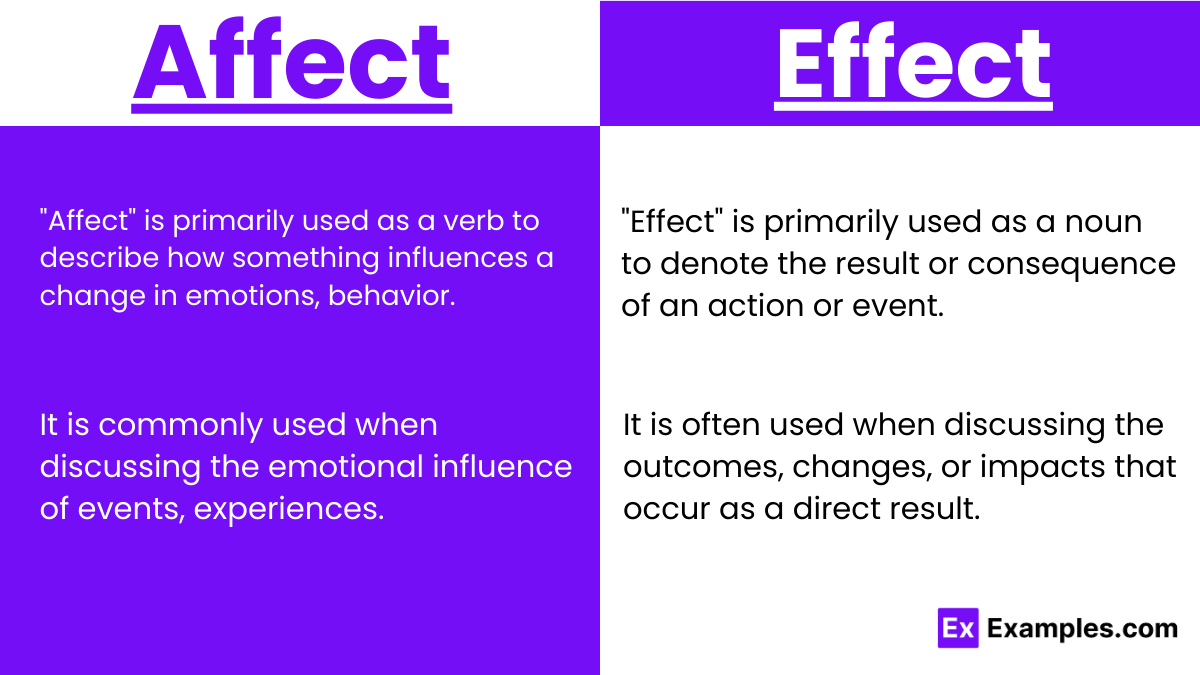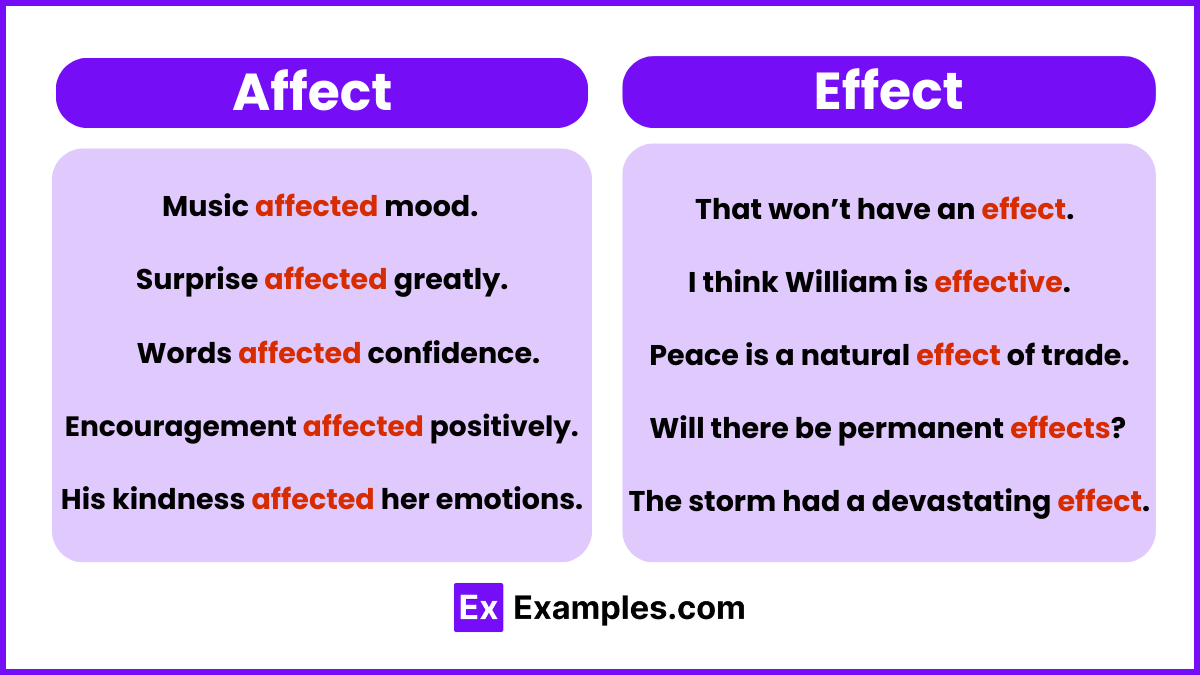Affect vs Effect – Meanings, Examples, Differences, Usage
“Affect” functions mainly as a verb, indicating the action of influencing or producing a change in something. It is often followed by a noun or a pronoun and can be used in various tenses, such as present, past, or future. When you want to describe how something influences or changes another thing, you typically use “affect.”
“Effect” is primarily used as a noun, representing the result or consequence of an action or event. It is often used with articles like “the” or “an” and can be followed by a prepositional phrase or a noun. When you want to describe the outcome or impact of something, you typically use “effect.”
Affect and Effect – Meanings
- Effect: Effect, when used as a noun, refers to the result or outcome of an action or event. It describes the change that occurs as a consequence of something happening. For example, “The implementation of new technology had a positive effect on productivity,” illustrates the beneficial outcome of introducing new technology.
- Affect: Affect, as a verb, means to influence or produce a change in something. It denotes the action of impacting or altering something else. For instance, “The music affected her mood,” indicates that the music influenced or changed her emotional state.
Summary
Affect is the action of influencing or producing change, particularly in emotional or psychological contexts. Effect, meanwhile, refers to the result or consequence of an action or event. While affect is typically a verb and effect is usually a noun, both words can be used interchangeably in certain contexts, making their usage occasionally confusing. However, understanding their fundamental meanings can help in distinguishing between them accurately.
Difference Between Affect and Effect
| Aspect | Affect | Effect |
|---|---|---|
| Part of Speech | Usually used as Verb | Usually used as Noun |
| Example | “The news affected her mood.” | “The new policy had a positive effect.” |
| Usage | Describes action of influencing or changing | Represents outcome or consequence |
| Emotional Impact | Often relates to emotions, behavior, mood | Typically devoid of emotional context |
| Observable Result | May not have a tangible, observable outcome | Often has a tangible, observable outcome |
| Psychological Term | Used in psychology to describe mood changes | Less common in psychological terminology |
| Frequency | More frequently used in everyday language | Less frequently used in everyday language |
How to Remember the Difference between Affect and Effect
Remembering the difference between affect and effect can be challenging, but here’s a helpful tip to keep them straight:
“Affect” starts with “A” like “Action.” Affect is typically a verb, indicating action or influence on something.
“Effect” starts with “E” like “End Result.” Effect is usually a noun, representing the end result or consequence of an action.
When to use Affect and Effect

Usage of Affect:
- Influence or Change: “Affect” is primarily used as a verb to describe how something influences or produces a change in emotions, behavior, or mood.
- Emotional Impact: It is commonly employed when discussing the emotional influence of events, experiences, or stimuli on individuals. For example, “The touching story deeply affected the audience.”
- Psychological Expression: In clinical or psychological contexts, “Affect” may refer to observable expressions of mood or emotion, such as in the term “flat affect” to describe a lack of emotional responsiveness
Usage of Effect:
- Result or Consequence: “Effect” is primarily used as a noun to denote the result or consequence of an action or event.
- Outcome: It is often used when discussing the outcomes, changes, or impacts that occur as a direct result of something else happening. For instance, “The implementation of new policies had a positive effect on employee morale.”
- Observable Impact: “Effect” can also refer to observable changes or impacts, whether tangible or intangible, caused by a particular action or event. For example, “The sound of the alarm had an immediate effect on everyone in the room.”
How to use Affect and Effect
Affect
- When we use “affect,” we’re typically describing the act of influencing or producing a change in something.
- It’s like describing the action of one thing on another, often indicating how something impacts or alters a situation.
- For instance, you might say, “The sudden news affected her deeply,” meaning the news had an emotional impact on her.
- Similarly, in a scientific context, you might say, “Temperature can affect the rate of chemical reactions,” indicating how temperature changes can influence chemical processes.
Effect
- “Effect,” on the other hand, is usually used as a noun, denoting the result or outcome of an action or cause.
- It’s the consequence or aftermath of something happening.
- For example, if you say, “The new law had a significant effect on the community,” you’re talking about the noticeable change or impact the law had on the community.
- In a creative context, you might say, “The artist used light to create stunning effects in the painting,” referring to the visible results or visual impacts achieved through the use of light
Examples of Affect and Effect

Examples of “Affect”:
- The news of her promotion positively affected her mood.
- The loss of his pet deeply affected him.
- Her smile affected everyone around her, brightening their day.
- The loud noise affected his ability to concentrate.
- The surprise affected her greatly, bringing tears of joy.
Examples of “Effect”:
- The rain had a cooling effect on the hot pavement.
- The medication’s side effects include dizziness and nausea.
- The new policy had a positive effect on employee morale.
- The sound of the alarm had an immediate effect, causing panic.
- The economic downturn had far-reaching effects on businesses.
Synonyms for Affect and Effect
| Affect | Effect |
|---|---|
| Influence | Result |
| Impact | Outcome |
| Change | Consequence |
| Alter | Ramification |
| Modify | Implication |
| Shape | Product |
Exercise
Fill in the blank with the correct form of “Affect” or “Effect”:
- The new medication had a positive __________ on her health.
- How does stress __________ your ability to concentrate?
- The sudden change in weather had a significant __________ on crop yields.
- The teacher’s encouragement had a motivating __________ on the students.
- It’s important to consider the long-term __________ of your decisions.
- Will the recent policy changes __________ our project timeline?
- The loud noise from the construction site can __________ your ability to sleep.
- She couldn’t predict how her actions would __________ others.
- The documentary highlighted the devastating __________ of deforestation on wildlife.
- Does lack of sleep __________ your mood the next day?
Answers
- effect
- affect
- effect
- effect
- effects
- affect
- affect
- affect
- effects
- affect
FAQS
Will it affect me or effect me?
Use “affect” for actions, like “Will it affect me?” “Effect” is a noun, so it’s incorrect here.
Is it something to that effect or affect?
“Effect” is correct. It means a similar result. “Affect” is a verb, not a noun like “effect.”
Can you use affect and effect in a sentence?
Sure! “The loud noise affected his concentration.” “The medication had side effects.” “Affect” is a verb, “effect” is a noun.
What is emotional affect?
Emotional affect refers to outward displays of emotion, like facial expressions or gestures, reflecting one’s emotional state. It’s observable behavior indicating feelings.



